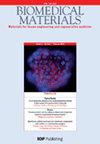Microstructure, mechanical strength, chemical resistance, and antibacterial behavior of Ti–5Cu–x%Nb biomedical alloy
IF 3.7
3区 医学
Q2 ENGINEERING, BIOMEDICAL
引用次数: 2
Abstract
Titanium-based biomedical alloys are susceptible as they are used as a substitute for human bone. In this study, titanium alloy, Ti–5Cu–x%Nb (x = 0, 5, 10, 15) (%wt) was developed by powder metallurgy route. The effect of alloying niobium with Ti–5Cu alloy and its effect on the microstructure, mechanical strength, corrosion resistance, and antibacterial properties have been evaluated. The results show that the sintered alloy has both α-Ti and Ti2Cu phases. With increasing niobium content in the alloy, β-Ti was also detected. Additionally, it was found that the micro-hardness and compressive strength of the studied alloy was better than commercially pure titanium (cpTi), while the Young’s modulus was lower than cpTi. These properties are highly favorable for using this alloy to replicate the human cortical bone. The alloy was also tested for anticorrosive property in Ringer’s solution. The antibacterial activity was also examined for Staphylococcus aureus and Escherichia coli bacteria. The alloy showed promising anticorrosive and antibacterial ability.Ti-5Cu-x %Nb生物医学合金的显微组织、机械强度、耐化学性和抗菌性能
钛基生物医学合金是易受影响的,因为它们被用作人类骨骼的替代品。本研究采用粉末冶金方法制备了Ti-5Cu-x %Nb (x = 0,5,10,15) (%wt)钛合金。研究了铌与Ti-5Cu合金的合金化效果及其对合金组织、机械强度、耐蚀性和抗菌性能的影响。结果表明:烧结后的合金既有α-Ti相,又有Ti2Cu相。随着合金中铌含量的增加,也检测到β-Ti。此外,所研究的合金的显微硬度和抗压强度优于商品纯钛(cpTi),而杨氏模量低于cpTi。这些特性对使用该合金复制人类皮质骨非常有利。在林格氏溶液中测试了合金的防腐性能。对金黄色葡萄球菌和大肠杆菌的抑菌活性也进行了检测。该合金具有良好的防腐和抗菌性能。
本文章由计算机程序翻译,如有差异,请以英文原文为准。
求助全文
约1分钟内获得全文
求助全文
来源期刊

Biomedical materials
工程技术-材料科学:生物材料
CiteScore
6.70
自引率
7.50%
发文量
294
审稿时长
3 months
期刊介绍:
The goal of the journal is to publish original research findings and critical reviews that contribute to our knowledge about the composition, properties, and performance of materials for all applications relevant to human healthcare.
Typical areas of interest include (but are not limited to):
-Synthesis/characterization of biomedical materials-
Nature-inspired synthesis/biomineralization of biomedical materials-
In vitro/in vivo performance of biomedical materials-
Biofabrication technologies/applications: 3D bioprinting, bioink development, bioassembly & biopatterning-
Microfluidic systems (including disease models): fabrication, testing & translational applications-
Tissue engineering/regenerative medicine-
Interaction of molecules/cells with materials-
Effects of biomaterials on stem cell behaviour-
Growth factors/genes/cells incorporated into biomedical materials-
Biophysical cues/biocompatibility pathways in biomedical materials performance-
Clinical applications of biomedical materials for cell therapies in disease (cancer etc)-
Nanomedicine, nanotoxicology and nanopathology-
Pharmacokinetic considerations in drug delivery systems-
Risks of contrast media in imaging systems-
Biosafety aspects of gene delivery agents-
Preclinical and clinical performance of implantable biomedical materials-
Translational and regulatory matters
 求助内容:
求助内容: 应助结果提醒方式:
应助结果提醒方式:


